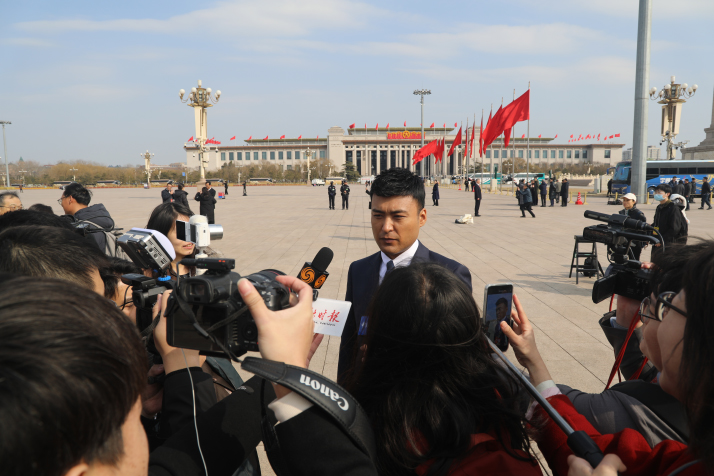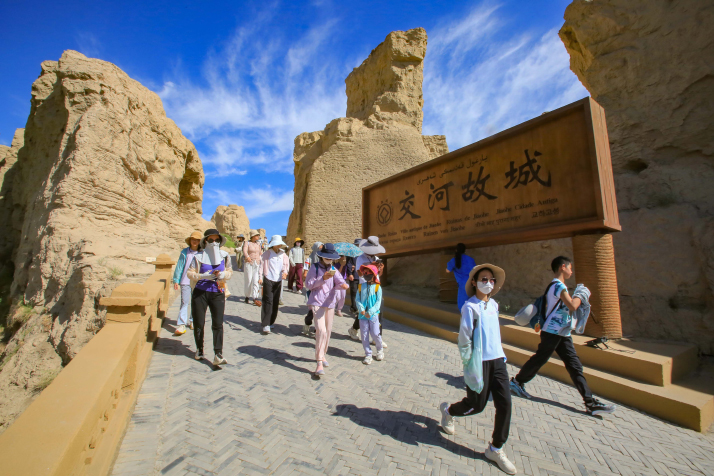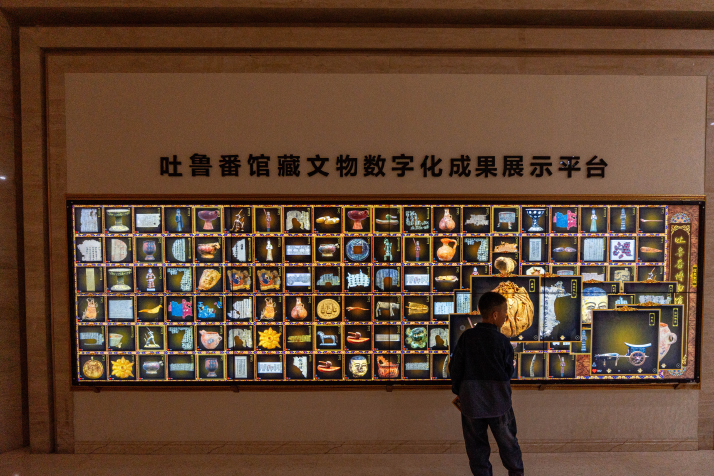| Xinjiang Today |
| From influencer to the Great Hall of the People | |
|
|
 Heinizat Tohti speaks to reporters on the sidelines of the annual session of the Chinese People's Political Consultative Conference National Committee, the country's top political advisory body, in Beijing in early March (COURTESY PHOTO)
"preading laughter and connecting hearts with stories" is the credo that Heinizat Tohti has upheld for many years. This online celebrity from Xinjiang Uygur Autonomous Region has made a lasting impression on netizens nationwide with his bright smile since the moment he appeared before the press as a member of the National Committee of the Chinese People's Political Consultative Conference (CPPCC), the country's top political advisory body, in March 2023. As early as 2017, Heinizat and his team created the web series Pomegranate Is Ripe, which brought the lives of Xinjiang's youth to the screen through a multi-ethnic cast and humorous skits. The series featured fantastical crossovers with Journey to the West, an ancient Chinese literary classic, the Flaming Mountains, a range of red sandstone mountains located in Turpan City of Xinjiang, as well as heartwarming moments of everyday life, becoming an influential new media creative product in northwest China. "We don't do exotic borderland narratives; instead, we share local and national culture," he told Xinjiang Today. Heinizat believes that although audience attention span is limited in the era of short videos, as long as the content is engaging enough, viewers will naturally delve deeper into the underlying culture. Taking Pomegranate Is Ripe as an example. Viewers can learn about Xinjiang's culture while being entertained by the interesting stories. For Heinizat, short dramas possess stronger narratives and higher entertainment value, making them more appealing to audiences. His team plans to create humorous short dramas that integrate Xinjiang's cultural and tourism resources, and venture into genres like fantasy and time travel in the future to break through traditional ways of presenting cultural and tourism content. Meanwhile, Heinizat noted that the dissemination of short dramas needs to be optimized according to the characteristics of different platforms to achieve higher viewership and attention. In addition to improving short dramas, Heinizat also fulfills his responsibility as a political advisor. CPPCC National Committee members are involved in national governance, making proposals for the betterment of society. In the face of the proliferation of false information due to the misuse of AI technology, Heinizat submitted a proposal this year against AI-generated misinformation, directly addressing the ethical dilemmas of technology.  Visitors at the Jiaohe Ruins in Turpan City on July 11, 2024. The ancient city of Jiaohe, which can be dated back to around 2,300 years ago, was a key passage on the ancient Silk Road (VCG)
Reviving relics Cultural relics protection is a focus area of Heinizat. He believes that cultural relics are not ageless specimens but living history. He has participated in research trips, covering more than 10 prefectures and cities in Xinjiang, and witnessed the effective protection and development of cultural relics. However, he also noticed some challenges: The bas-reliefs of the Rawak Temple in Hetian Prefecture, a major Buddhist site along the ancient Silk Road, lay dusty in storage; and the murals of Buddhist grottoes dating back to more than 1,000 years ago were only explained on an accompanying paper label. During last year's Two Sessions, the annual sessions of the National People's Congress and the CPPCC National Committee usually held in March, Heinizat proposed telling the stories behind Xinjiang's cultural relics with the help of digital technology. "Many of Xinjiang's cultural relics and historic sites are in a state of ruin. When you actually visit them, you might only see some remnants. But through digital restoration, you can see their original appearances. Thanks to this technology, we can exhibit them nationwide—even worldwide," he said. A year later, he has spotted changes. At the Kizil Caves in Aksu Prefecture, tourists can wear augmented reality glasses to witness how painters mixed mineral pigments 1,000 years ago; through virtual reality technology, the ruined walls of the Jiaohe Ancient City come to life with the bustling scene of caravans. In the face of the impact of AI technology, this year Heinizat includes a new content in his proposal: "Empowering the protection of intangible cultural heritage with AI." In Kashi (Kashgar), university teams are using AI to restore the nearly lost Twelve Muqam—a genre of the traditional Uygur Muqam art—musical scores; in Turpan, AI-generated multilingual commentary allows foreign tourists to understand the wisdom of Xinjiang's Karez well system, an ancient and ingenious method of irrigation and water management. "Some people worry that technology will erode tradition, but I don't think so. Technology will empower," he said. "AI technology will not erode the authenticity of ethnic art; instead, it will better protect and enhance traditional culture through technological iteration." He added that he is currently studying how to combine AI with intangible cultural heritage protection, using digital means to better express and disseminate traditional culture. Heinizat believes that young people should focus on research in this area, enhancing their professionalism and technical skills to meet the challenges of the new era.  Digitalized cultural heritage at the Turpan Museum in Turpan City on October 5, 2023 (VCG)
Innovating cultural communication From cultural communication to technology governance, Heinizat's work has always been in step with the pulse of the times. Cross-border e-commerce has become a new area of focus for him. It has now been more than a year since the establishment of the China (Xinjiang) Pilot Free Trade Zone (FTZ), which presents an unprecedented opportunity for westward opening up and foreign economic engagement. As the 22nd FTZ in China and the first in the country's northwestern border regions, the Xinjiang FTZ has been given greater autonomy in carrying out reforms and encouraged to cultivate industries unique to the region. In 2023, when the Xinjiang FTZ was established, cross-border e-commerce experienced explosive growth. Heinizat seized the opportunity and shifted his focus to e-commerce empowerment. In rural Hetian (Hotan) Prefecture, over 10,000 farmers and herders have received training on e-commerce under his "One Phone, One Business" initiative. In his view, technological equality bridges regional gaps, allowing ordinary people in the borderlands to become ambassadors for international communication. "Cultural communication is not just about showcasing scenery; it's about creating opportunities." When elderly people from the borderlands can sell their apricots in Beijing and the songs of Kazak herders can be heard by foreign audiences, that is the best narrative of cultural communication. Nurturing online celebrities in Xinjiang for cultural communication is something he has been working on recently. In 2024, his team delivered training to residents in remote areas of Xinjiang, helping local creators master short video production skills and enhance their content creation abilities. He mentioned that through the training, many creators have sold agricultural products online, increasing their income. Cultural barriers often stem from unfamiliarity, and food and dance are the most universal languages. This "localized narrative" strategy is his answer to the challenges of globalization. To appeal to residents of Central Asia, in 2024, Heinizat chose topics such as cuisine and lifestyle for content creation. He collaborated with local influencers, and adopted local expressions, successfully capturing the attention of Central Asian audiences. His team has also collaborated with international students to create short video content tailored to Central Asian audiences, further enhancing the communication effect. (Print Edition Title: Breaking Boundaries) Comments to taozihui@cicgamericas.com |
|
||||||||||||||||||||||||||||
|